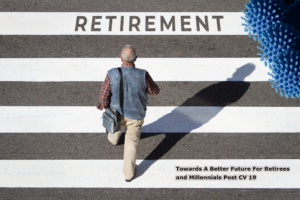Current Situation
In Melbourne, Australia we are currently in lockdown in fear of contracting and spreading Coronavirus (CV19). It is a silent killer that we cannot see, feel, or smell which we may or may not finally defeat with a vaccine. Many of our current ways of life have been disrupted including the future of work and it has thrust upon us the increasing reliance on the use of technology to overcome or reduce the impact of CV19. It is bringing about what will likely be lasting changes to society.
The goal of this article is to look at the opportunities to re-imagine a better future for retirees, millennials and the future of work. It now time to discuss long-overdue reforms in global pension systems for retirees and housing affordability for the millennial generation and beyond. Considering the pension systems independent of housing finance reform would be a mistake because they are interdependent.
Fundamentally, it is about finally looking at lifting nations’ productivity using technology like the International Monetary Fund proposed in 2017. Let us have a look at the background and some of these opportunities.
Background to The Need for Reform
The International Monetary Fund (IMF) has been aware of the need for these reforms for a long time. On 11/10/17 Christine Legarde when she was Managing Director of the IMF conducted the New Economy Forum: Future of Work (The Forum) (1). This was the focus of The Forum:
“The New Economy Forum will focus on the future of work from three areas. First, the technological innovations that will bring about changes in our workplaces and labor markets. Second, the socioeconomic impact of technological innovation. Lastly, the skills and education necessary to adapt to change and how to design policies that respond to change while ensuring sustainable and inclusive prosperity.”
These were the thought leaders who were invited to attend The Forum because of their history and expertise at that time:
- Jim Clifton is the CEO of Gallup, a global leader in public opinion research and advanced analytics.
- Deborah Greenfield is the Deputy Director-General for Policy at International Labour Organization. She leads policy, research, and statistical work across a range of labor and employment issues.
- Sara Horowitz is the Founder and Executive Director of the Freelancer’s Union, a non-profit organization that promotes the interest of 55 million independent workers in the U.S. She is also currently the Chair of the Board of the Federal Reserve Bank of New York.
- Jeremy Johnson is the Co-founder and CEO of Andela, a company that recruits the most talented software engineers on the African continent and pairs them with global tech companies.
- James Manyika is the Chairman of the McKinsey Global Institute (MGI). Based in Silicon Valley for over 20 years.
What are The Reforms Needed that The Forum Were Discussing in 2017?
The International Monetary Fund (IMF) issued a report Global Financial Stability Report, April 2012 : The Quest for Lasting Stability which said in this section – The Financial Impact of Longevity Risk (2) in the summary: “These risks build slowly over time, but if not addressed soon could have large negative effects on already weakened private and public sector balance sheets, making them more vulnerable to other shocks and potentially affecting financial stability.”
Longevity risk for consumers refers to the risk that they will outlive their savings for retirement and for providers of pensions and annuities it is the risk that the assumptions for annuities, superannuation and pension plans will be incorrect because of the increasing life expectancies of consumers.
The Deputy Managing Director of the IMF, Min Zhu in a speech on 11/6/2014 on Housing Markets, Financial Stability and the Economy (3) made this point:
“Despite its importance, however, the housing sector has not received adequate attention from macroeconomists. As Ed Leamer once noted, leading textbooks in the field often did not have any mention of the housing sector. Of course, all that has changed since the Great Recession. The bursting of the real estate bubble in the United States was followed by the deepest global downturn since the Great Depression. It reminded people of the collateral damage that can be triggered by housing collapses.”
What are The Consumer Reform Opportunities For Longevity Risk in Pensions and Housing Market Affordability and Risk Management?
Longevity Risk
The reform opportunities that The Forum was discussing related to the technological advancements that have occurred which have changed the future of work. This directly impacts on longevity risk or the real fear that retirees have of running out of money in retirement.
CV19 has opened the realization of the public globally and employers that a lot of work can be done online and work from home teams can easily operate, even on a global basis. This also allows people to retire part-time and therefore change the longevity risk of retirement savings.
It also enables parents filling a childcare role to work part-time from home. This has previously seriously disadvantaged women in savings for retirement. How can this reform envisaged by The Forum members be accomplished at an operational consumer level when helped by government policy?
- By acknowledging that the CV19 has changed the role of technology in society forever.
- By requiring the global financial planning and superannuation consultants to include the impact of retiring part-time on the longevity risk calculation of retirees savings. This would require having international standards set like accounting standards e.g. International Financial Reporting Standards Foundation (IFRS) (4).
- By supporting at a government level, the investment of the social infrastructure that will support working from home and retiring part-time rather than relying on market forces and voluntary organizations to provide the support and skills training to do so. e.g. AARP Foundation (For a future without senior poverty): Work for Yourself @50+ (5)
- By recognizing that the union movement of the past is transforming into an association of unaffiliated workers that should be financially supported and encouraged by governments because it is in the national interest for productivity e.g. Freelancers Union (6)
- By recognizing that unaffiliated workers do not have the safety net of working for employers or governments with negotiated safety nets built up over many years and they should be encouraged and supported by governments because it is the national social security interest e.g. Trupo (Creative freedom without the sacrifice) (7)
- By recognizing that technology has brought into focus that there is what the United Nations International Labour Organization calls a mismatch of skill sets. This has given rise to giant online training organizations to meet this need e.g. Coursera (8), Udemy (9) , LinkedIn (10)
- By recognizing that technology and working from home has created isolated unaffiliated workers that need to form into mutual support groups both from a technical viewpoint and from an emotional lifestyle point of view. It is also in the national interest for productivity and mental health. It is critical to understand Mastermind Groups and their benefits e.g. Stewart, Cooper & Coon (A human capital strategies firm) article. (11) . Mastermind Groups are mutual support groups that use brainstorming, goal sharing, feedback, and friendship between members to advance the members’ work and lifestyle goals. Often the groups have facilitators or leaders.
Housing Market Affordability and Risk Management
In my view, The Deputy Managing Director of the IMF, Min Zhu’s point in his speech on 11/6/2014 on Housing Markets, Financial Stability and the Economy (2) is still correct:
“Despite its importance, however, the housing sector has not received adequate attention from macroeconomists.” Like the better risk management of Longevity Risk this requires international standards set like accounting standards e.g. International Financial Reporting Standards Foundation (IFRS) (4).
If international risk management standards were to be developed like accounting standards, I believe that the following steps would assist in their evolution:
- By making housing loans a financial product requiring a higher level of advice thereby giving better risk management protection to consumers. Better protection for consumers is required, like better public debt management e.g. IMF Policy Paper on Revised Guidelines for Public Debt Management. (12)
- By recognizing that having international risk management standards for housing loans it would help eliminate the mismanagement of risk associated with housing loans that caused the Global Financial Crisis and help consumers’ balance sheets recover post the CV19 economic recession e.g. The IMF’s Response to The Global Economic Crisis (13)
- By recognizing that the reforms discussed at The Forum in relation to the future of work and retirement would change the formulas of housing loans by allowing borrowers to have a longer-term in their housing loans. This would improve affordability for the millennial generation and beyond. e.g. The GHLC Reform and Japanese Housing Finance Market (14)
- By changing the basis of risk management of housing loans for the affordability of loans related to the choice between variable-rate to fixed-rate housing loans to focusing on the budget of the borrower. This is of particular importance when interest rates are at a 5,000 year low according to Andy Haldane, the Chief Economist at The Bank of England e.g. Business Insider article: The 5,000-year history of interest rates shows just how historically low US rates still are right now. The research source is shown in the article. (15)
- By creating consumer-focused international housing loan risk management standards embracing interest rate loading relating to the breaking of fixed-rate housing loan contracts, negative equity protection loading relating to foreclosure protection up to the level of the debt for consumers and non-optional consumer credit insurance loading. This would help prevent a crisis in relation to debt management resulting from the CV19 pandemic and beyond. e.g. U.K.’s Money and Advice Service: What is a Debt Management Plan (DMP)? (16)
Conclusion
The purpose of this article is to start a discussion about these important consumer topics as we realize new opportunities and ways of doing things to recover from the impact of CV19.
Disclosures
I have been campaigning for these reforms for several years both in Australia where I live and through the United States Securities and Exchange Commission.
I currently have a copyrighted computer software Innovation Patent was being examined at IP Australia related to making housing loans a financial product. The Innovation Patent number is 2019101063 and it has been superseded by a Divisional Innovation Patent grant 2020102287 and it is publicly listed here: http://pericles.ipaustralia.gov.au/ols/auspat/quickSearch.do.
The related copyrighted software to the Innovation Patent grant 2020102287 is live and has been published here:
Protected: CONSUMERS’ HOME LOAN REPAYMENT PLANNER
I disclose that I may have some financial benefit from this work in the public interest.
Affiliations
I am a member of the following organizations:
The Media Entertainment & Arts Alliance
The Financial Planning Association of Australia Limited
The Finance Sector Union of Australia
The Identity Management Institute
My Websites
https://www.freelance-work-guide.com/
https://www.identity-theft-scout.com/
https://5starinnovation.com/consumers-home-loan-repayment-planner/ (Beta)
Reference Links
- https://www.imf.org/external/
- https://www.elibrary.imf.org/view/IMF082/12282-9781616352479/12282-9781616352479/ch04.xml?rskey=rnnD6F&result=4&redirect=true
- https://www.imf.org/en/News/Articles/2015/09/28/04/53/sp060514
- https://www.ifrs.org/about-us/
- https://workforyourself.aarpfoundation.org/
- https://www.freelancersunion.org/
- https://www.coursera.org/
- https://www.udemy.com/
- https://www.linkedin.com/
- https://stewartcoopercoon.com/understanding-mastermind-groups-and-their-benefits/
- https://www.imf.org/external/np/pp/eng/2014/040114.pdf
- https://www.imf.org/external/np/exr/facts/pdf/changing.pdf
- https://www.oecd.org/finance/financial-markets/1844710.pdf
- https://www.businessinsider.com.au/interest-rates-5000-year-history-2017-9?r=US&IR=T
- https://www.moneyadviceservice.org.uk/en/articles/what-is-a-debt-management-plan
Copyright © John Cosstick
If you wish to comment on an article or post, please use the contact form below.





